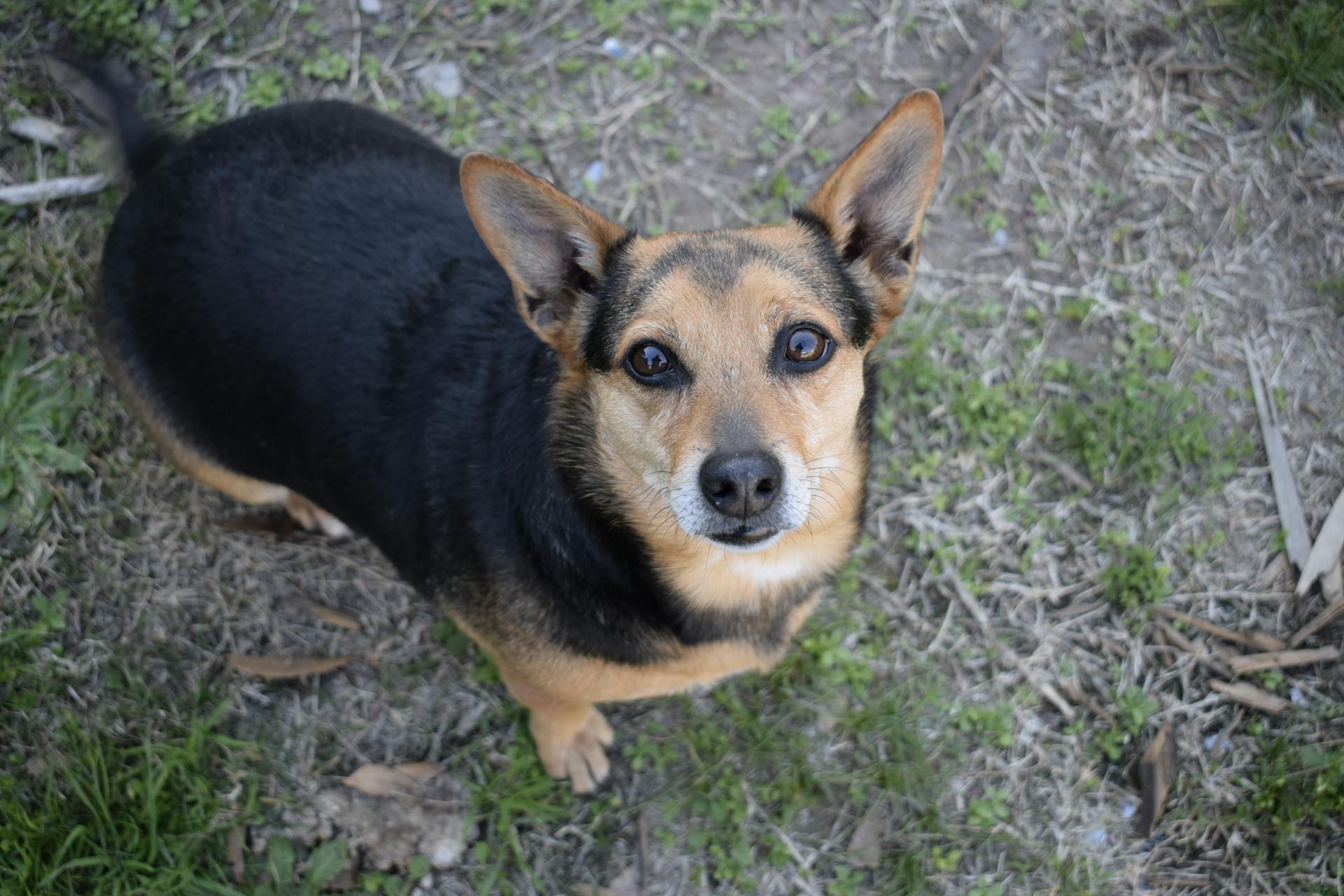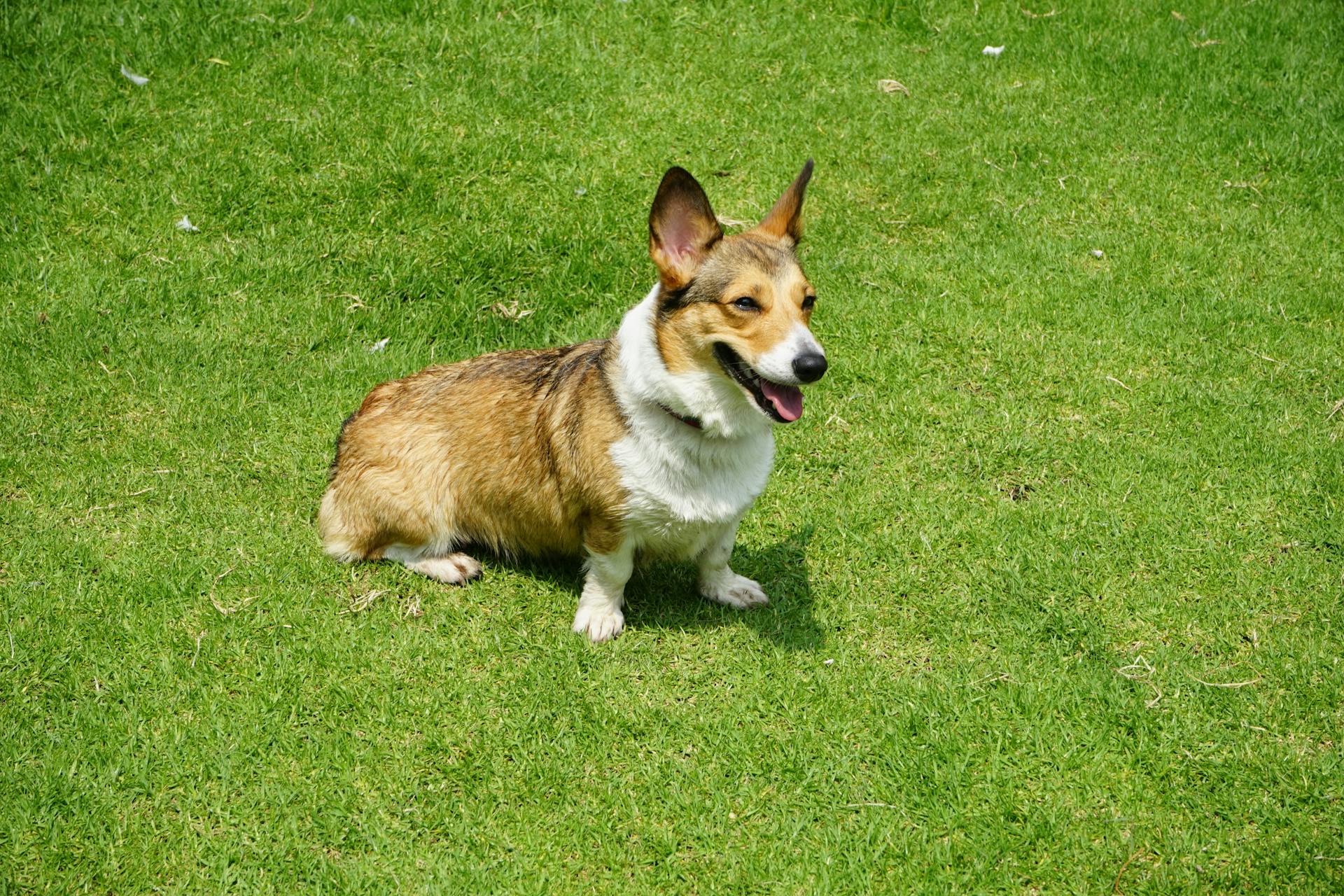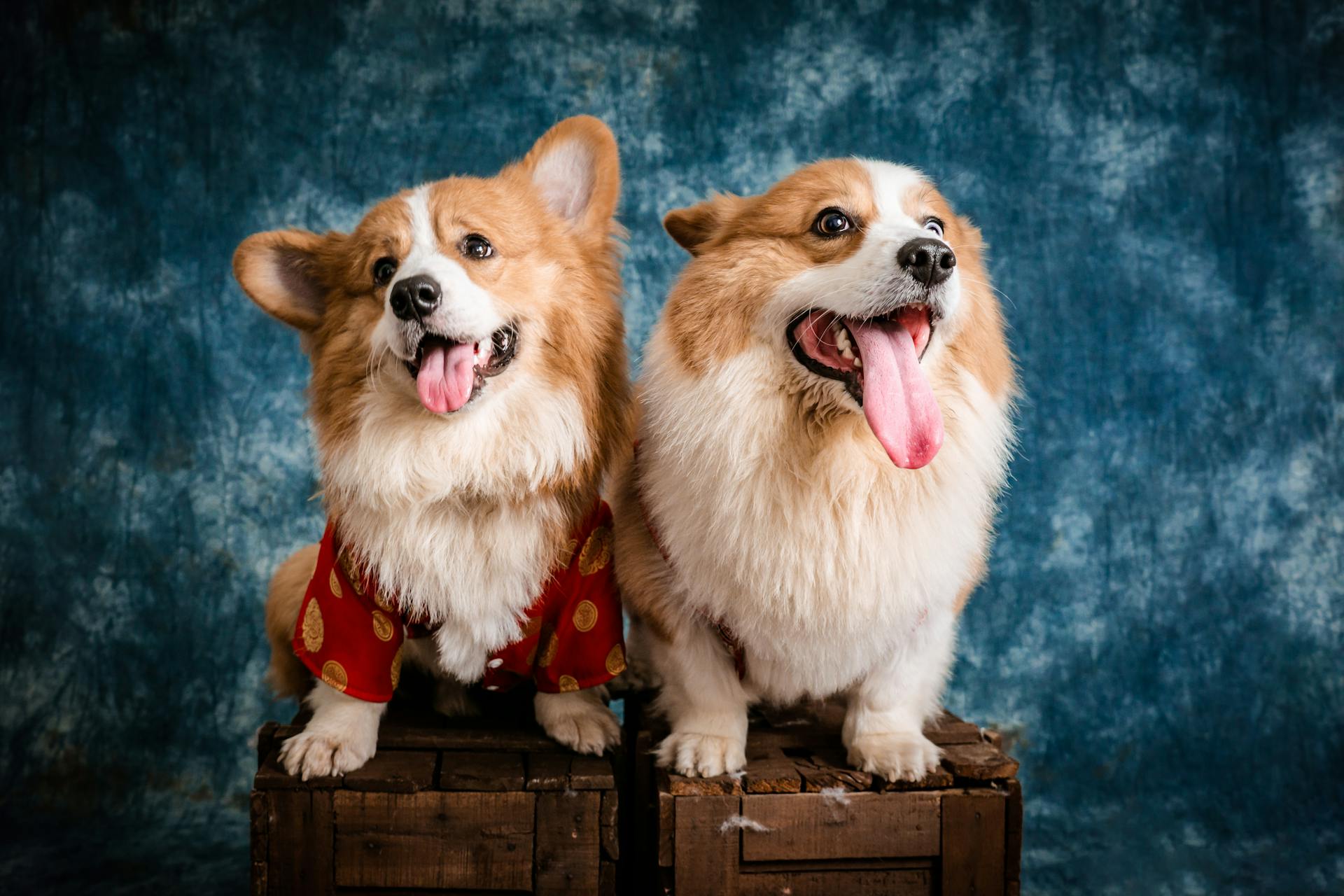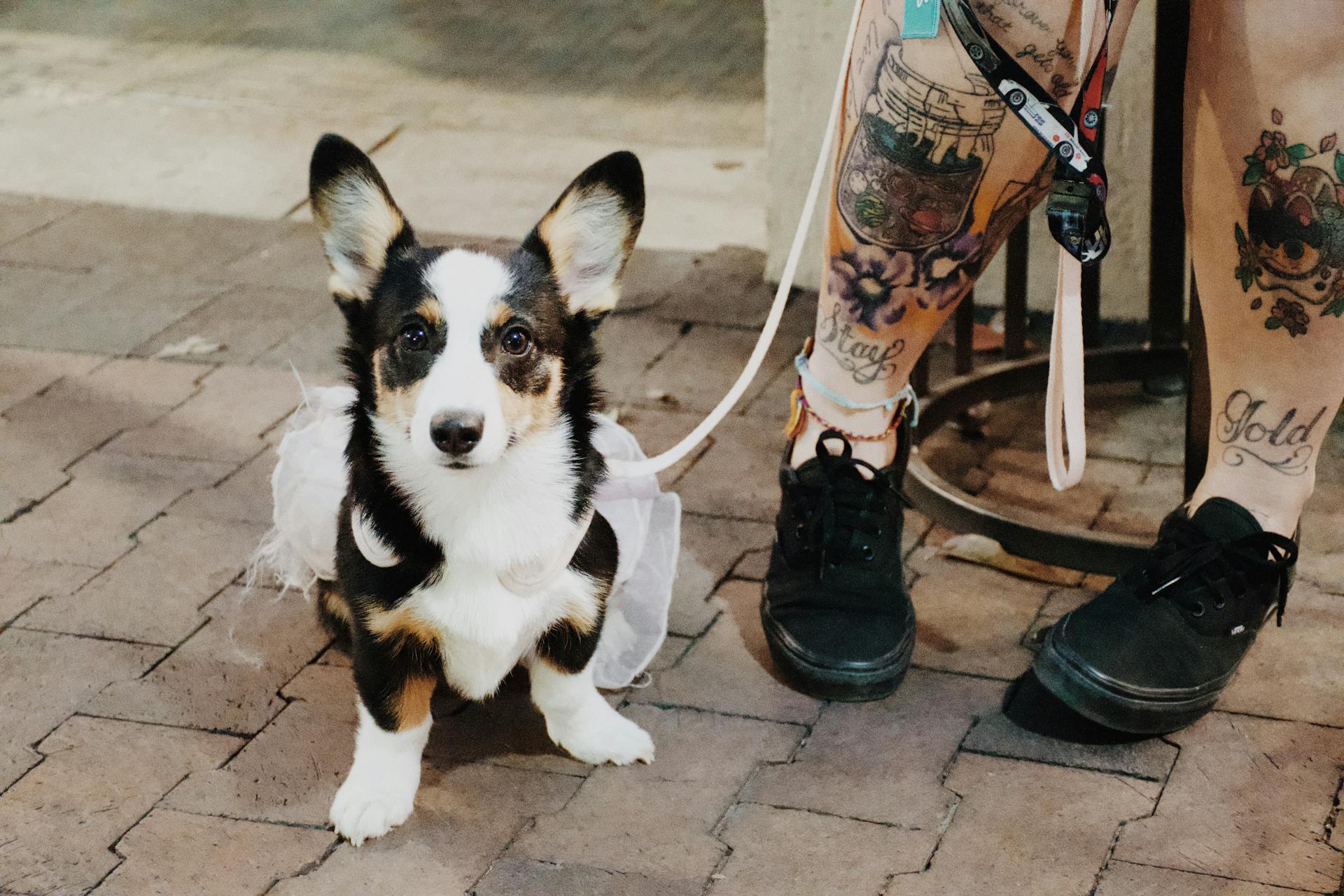
Pembroke Welsh Corgis are a beloved breed for many reasons, but their size is often a topic of interest. On average, an adult Pembroke Welsh Corgi weighs between 25-38 pounds and stands about 10-12 inches tall at the shoulder.
They're a relatively small dog, which makes them a great fit for city living or families with smaller spaces. You can expect to see some variation in size depending on lineage and overall health.
To ensure your Pembroke Welsh Corgi stays healthy and happy, regular exercise is crucial. Aim for daily walks of at least 30 minutes, and consider adding playtime and training sessions as well.
Breed Description
Pembroke Welsh Corgis are known for their unique appearance and stature.
They have a fox-like face and large ears. Their short legs and long, sturdy body weigh between 20 and 30 pounds and stand between 10 and 15 inches tall.
Their distinctive feature is often referred to as a "bobbed tail", although docking is becoming less common for this breed, with more Pembrokes sporting a longer tail instead.
Corgis tend to have adorable fluffy butts, earning them the nickname "loaves of bread."
These athletic herding dogs love to work and play, making them excellent companions that will endlessly entertain.
History and Development
The Pembroke Welsh Corgi has a rich history dating back centuries. They originated from short-legged dogs brought by Flemish settlers to Wales in the 12th century.
These early dogs were excellent working companions that helped their owners with herding cattle and other livestock. Their ancestors, such as the Pomeranian and Schipperke, had been used for this purpose in northern Europe for centuries.
The Pembroke Welsh Corgi was bred specifically for their sturdiness, working abilities, and good temperament rather than looks.
Breed History
The Pembroke Welsh Corgi has a rich history that spans centuries and continents.
In Welsh folklore, fairies are said to have gifted two Corgis to children who found them, making the breed an indispensable addition to farm life.
These early Corgis were likely descendants of short-legged dogs brought by Flemish settlers to Wales in the 12th century.
They were excellent working dogs that helped these settlers herd cattle and other livestock.
The Pembroke Welsh Corgi was bred specifically for their sturdiness, working abilities, and good temperament rather than looks.
It wasn't until 1920 that the Kennel Club officially recognized the Welsh Corgi breed.
North American History

The Pembroke Welsh Corgi has become a popular breed in the United States, having been recognized by the American Kennel Club in 1934.
Lewi Roesler's Pembroke "Little Madam" was the first registered Corgi, arriving in the U.S. from London just a year earlier.
Their excellent personalities and adaptability have contributed to their skyrocketing popularity.
By 1998, the Pembroke Welsh Corgi was ranked as the 37th most popular dog breed.
They jumped to the 13th most popular spot in 2018, solidifying their place in American hearts.
Corgis are a favorite on Instagram, with many puppies having their own accounts and huge followings.
A unique perspective: Why Are Corgis so Popular
Tail Docking History
Corgis were originally born with longer tails that often had a fluffy appearance and a white tip at the end.
The practice of docking Pembroke Welsh Corgi puppies' tails between two and five days old is considered the breed standard by some kennel clubs, including the AKC and CKC.
Historically, tail docking was done to prevent corgis from getting caught or trampled while herding cattle.
It's believed that this practice started at an unknown time in the past.
Growth and Health
The Pembroke Welsh Corgi is a relatively long-lived breed with an average life expectancy of 12-13 years.
Regular veterinary visits and examinations are crucial to address health issues as soon as possible due to the breed's proneness to several health problems.
Their lifespan can be attributed to responsible breeding practices, but it's essential to stay on top of their health needs.
Here's an interesting read: Rhodesian Ridgeback Problems
Size
Pembrokes are a tad more slender than Cardigans, weighing about 21–31 pounds compared to the latter's 25–38 pounds.
While both breeds have similar height ranges, Pems are a smidgen shorter, with an average height of 10-12 inches.
Here's a comparison of their sizes:
Both breeds have unique physical characteristics, but it's essential to consider their growth and health needs.
Physical and Mental Development
Physical and Mental Development is a top priority for your Pembroke Welsh Corgi's growth and health.
These herding dogs were bred to run and herd all day, even with their short legs, so they require more exercise than other dog breeds of similar size.

Regular physical activity will keep your Corgi happy and healthy. Many Pembrokes enjoy hiking and swimming beyond their daily walks and games of fetch in the yard.
Mental enrichment is just as important as physical exercise for your Pembroke's development. These dogs were born to solve problems and work independently, so they need activities that challenge them intellectually.
Providing dog puzzles and interactive toys will keep your Corgi entertained and engaged.
You might enjoy: Shiba Inu .01
Health Issues
The Pembroke Welsh Corgi has an average life expectancy of 12-13 years.
Regular veterinary visits are essential to monitor your Corgi's health and catch any issues early on.
Routine examinations can help identify potential problems before they become severe.
This is especially important for a breed that's prone to several health issues.
Suggestion: Cardigan Welsh Corgi Health Issues
Ownership and Care
As a Pembroke Welsh Corgi owner, you'll want to know that these dogs are prone to obesity if not fed properly. They require regular exercise and a balanced diet.
Pembroke Welsh Corgis need daily walks of at least 30 minutes, and they also enjoy playing fetch or running around in open spaces. This breed is relatively low-maintenance when it comes to grooming, requiring only occasional nail trimming and brushing.
Their short stature means they can't tolerate extreme temperatures for long periods, so keep them indoors during hot summer days and provide a warm place to snuggle up on cold winter nights.
Prospective Owners
Choosing a breed is one of the most important decisions you'll make as a prospective dog owner. Consider factors like energy level, grooming needs, and family dynamics to find the perfect fit.
Why get a dog? For many people, it's about companionship and affection. Dogs provide unconditional love and can even help with mental health.
Finding a responsible breeder is crucial for ensuring you're getting a healthy puppy from good parents. Look for breeders who prioritize their dogs' welfare and are transparent about their breeding practices.
Getting started in dog sports can be a fun way to bond with your dog and challenge yourself as an owner. Consider activities like agility training or obedience classes.
All puppies require attention, patience, and love. As you bring home your new furry friend, remember that it's normal for them to feel scared and overwhelmed at first.
Grooming
Grooming is a must for Pembroke Welsh corgis and Cardigan Welsh corgis, as they are double-coated breeds that shed a little all the time.
You'll need to establish a weekly brush and snuggle routine with your furry friend to keep their coat under control.
Blowing coat season can be overwhelming, so it's essential to start early and make grooming a regular habit.
Personality and Temperament
Pembroke Welsh Corgis are known to be very friendly and energetic dogs.
They have a large-dog mentality in a medium-sized body, which makes them quite unique.
These dogs are very eager to please, so they enjoy training and learning new things.
Exercise and stimulation will also help decrease their propensity to dig and chew if they’re left alone too long or get bored.
Pembrokes do bark a lot and can be very vocal, making them an excellent guard dog.
They have a herding nature that makes them excel at herding animals much larger than themselves.
Most Pembrokes are fine with other pets in the house, and children if they are raised together.
Frequently Asked Questions
Is 30 pounds overweight for a Corgi?
According to American Kennel Club standards, 30 pounds is actually within the normal weight range for a full-grown Corgi. However, individual factors such as breed type and muscle mass can influence ideal weight, so it's best to consult with a veterinarian for personalized advice.
How to measure Corgi length?
To measure a Corgi's length, start at the breast bone (prosternum) and end at the rear of the hip (ischial tuberosity). The ideal ratio is 1.8:1 when measured from the ground to the withers.
What is the taller version of a Corgi?
The Cardigan Welsh Corgi is generally taller than its Pembroke counterpart. It's larger in both weight and height according to breed standards.
What is the natural breed of a Corgi?
A Corgi is a natural breed of cattle herding dog originating from Pembrokeshire, Wales. Specifically, there are two breeds known as Welsh Corgis: Pembroke Welsh Corgi and Cardigan Welsh Corgi.
Is my Corgi too tall?
A Corgi is considered too tall if they stand above 12 inches from floor to shoulder. If you're concerned about your Corgi's height, check our full breed guide for average growth charts and expert advice.
Sources
- https://www.trupanion.com/pet-blog/article/pembroke-welsh-corgi
- https://www.akc.org/dog-breeds/pembroke-welsh-corgi/
- https://www.petmd.com/dog/breeds/pembroke-welsh-corgi
- https://www.dogbreedinfo.com/pembrokecorgi.htm
- https://www.dailypaws.com/living-with-pets/pet-compatibility/types-of-corgis-pembroke-welsh-cardigan-welsh
Featured Images: pexels.com


